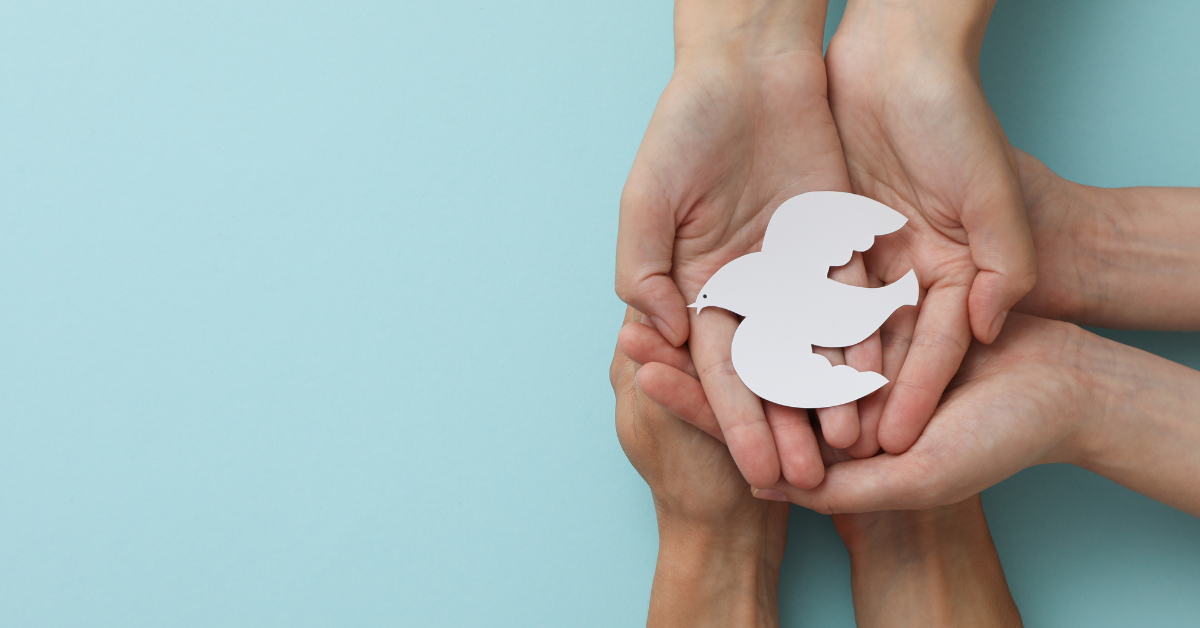117. Demonic Oppression or OCD? A Personal Story with Jessica Ray
Carrie interviews Jessica Ray about her experiences with OCD and faith. They discuss how OCD developed alongside Jessica’s newfound faith after childhood trauma.
Episode Highlights:
- The challenges of navigating OCD within Christian community.
- The importance of recognizing the difference between demonic oppression and mental illness.
- Jessica’s journey of finding relief through diagnosis and treatment.
- The supportive role of Christian community even at times they didn’t understand mental health struggles.
- Specific things that helped her along her journey of healing.
Related Links and Resources:
Jessica Ray’s YouTube Channel: www.youtube.com/@JessicaJoy34
Instagram: www.instagram.com/joynicole_34/
Episode Summary:
Welcome to Episode 117 of Christian Faith and OCD. For the past three years, I’ve seen firsthand how sharing personal journeys can deeply resonate with our community. Many of us facing anxiety and OCD may feel isolated, but connecting through shared experiences and faith can be incredibly uplifting.
In this episode, I’m honored to speak with Jessica Rae, who opens up about her personal battle with OCD. Jessica’s story is remarkable as her symptoms began in her late teens, right after a profound conversion to Christianity. She describes how her OCD manifested through relentless obsessive thoughts and paralyzing panic attacks, particularly around her role in evangelism and her personal relationships.
Jessica’s path to healing has been both challenging and inspiring. Initially, she encountered some misconceptions about mental health within her church community, which complicated her journey. However, Jessica’s perseverance led her to seek professional help and receive an accurate OCD diagnosis. This pivotal step marked the beginning of her significant progress in managing her symptoms.
Jessica’s experience highlights the critical role of recognizing mental health issues and finding the right support. It also emphasizes the power of faith and community in the healing process.
Explore Related episode:
Transcript
One thing that I’ve learned over the course of three years doing these podcast episodes is that you guys love personal stories. You find them very relatable because so many people dealing with anxiety and OCD feel isolated They feel like I’m the only one that’s going through these things.
So it really helps you to hear from other Christians who are also struggling and how they’ve seen God in their redemptive story. They’re still in process of working through some things. You know, we’re all on a journey to become more like Christ and in pursuit of healing from him. Today on the show, I have with me Jessica Rae and Jessica had emailed me when I was looking for guests and just offered to share her story. If you would like to be a part of our email list, definitely go on www.hopeforanxietyandocd/free. Hit up any of our downloads and then you can kind of be in the know and get random questions thrown at you sometimes.
Carrie: Jessica, I appreciate you responding to that and welcome to the show.
Jessica: Thank you for having me. Excited to be on.
Carrie: Tell me a little bit about how OCD showed up for you when you were younger.
Jessica: Whenever I was very tiny, under the age of two years old, I was a victim of sexual abuse. And I can remember having anxiety attacks, probably starting around four or five years old.
I also had an issue with food at a super young age. As a whole, I wouldn’t say that anyone ever recognized that I was an anxious child, but I definitely remember having things pop up like anxiety attacks if I was away from my parents or in a place that I wasn’t comfortable in. Anxiety really didn’t pop up for me until I was around 19 years old.
So my story’s probably a little bit different from other people. I didn’t really have any OCD type symptoms manifest until a little bit later on, until around 19, 20 years old.
Carrie: Okay. Do you feel like the people in your life just kind of saw some of these maybe as Age appropriate behaviors, like it’s somewhat normal for children to go through separation anxiety, and maybe they didn’t realize internally how much that was affecting you or how troubling that was for you?
Jessica: I would say so. I can remember having a very black and white bend in my thinking. And a shame oriented type thinking, especially if it had to do with getting in trouble or rules, or if I’d done something wrong, I could only hold it for so long and I had to go and confess it. I can remember going to church off and on as a kid and somehow I only heard hell.
I didn’t hear the gospel. My brain focused in on the idea of hell and I just thought I was going there. I can recognize internally that I had some issues. Very black and white thinking and some shame based thinking, but outwardly, I would say I appear pretty, if you want to call it, normal. Right. So it would make sense that my parents didn’t think to take me to a professional or anything like that.
Carrie: Yeah. What showed up when you were 19? What happened there?
Jessica: 19 is when I was born again. 19 is whenever I began my relationship with Jesus. I had a very, very radical conversion for lack of a better way to put it. Things changed for me overnight. God really just changed my heart and I was truly born again.
I was all in 100 percent and that is when the obsessive thinking, the panic, the anxiety started to manifest. I would say the first, after two or three months in going to church regularly. Being in the scriptures, starting to be discipled, I started to have some behaviors and some ways of thinking, looking back on it, that I’m like, there’s OCD.
Some examples that I could share would be, a few months in, I had a thought that I needed to end a relationship that, a friendship that I’d had from childhood. And this person wasn’t a believer, but she wasn’t bringing any sort of that influence into my life. And I just had this thought that I needed to end this friendship.
Even after talking to my youth pastor and them encouraging me not to do that, the anxiety, the obsessive thinking that what if that was God’s voice and I’m being disobedient, that sort of thing. Just was so intense that I ended the friendship. That was kind of the beginning of it. After that OCD latched on to evangelism.
I was a baby, baby Christian. I’m introverted by nature. I’m not somebody that just walks up to strangers and let me tell you about Jesus. It usually happens in a relational form for me, but it seemed that anytime I would hear a teaching. And it seemed that I was deficient and are not doing things that I should be doing, quote unquote, not doing things the right way my brain would latch on to it.
So very early on, I had an evangelism obsession. The anxiety of walking up to a stranger probably outweighed the anxiety of OCD in most points, but I remember going and knocking on doors at my grandma’s apartment complex in absolute torment. Praying for people having a pure heart wanting to honor God, but just not knowing what was going on And having thoughts and every thought that I have, I think it might be God.
I was in quite a bit of torment the first year of my walk with God because of undiagnosed OCD.
Carrie: Wow. The people that were discipling you, did they pick up like something just doesn’t seem quite right here? Like, were you asking for a lot of reassurance or, but maybe they couldn’t put their finger on it of what was going on?
Jessica: Yes. About three or four months in, the evangelism compulsions hit. I was living in Northeast Texas, which is not where I’m from. I’m from Houston area. And I started going to this church. I went to church by myself. My dad would drop me off and I would just go because nobody in my family was really following the Lord.
On my journey, God’s really put people in my life really to protect me. People that were very kind, but were also very patient and would kind of deal with the reassurance that I needed. I had a pastor that I would call at seven o’clock in the morning. He was so kind and patient, but yes, I had the wife of my associate pastor and then the pastor of the church that I was going to, my best friend, I would call her at three o’clock in the morning because I couldn’t sleep, I was just absolutely tormented and they would try to direct me and give me reassurance.
You have to be led by the Holy Spirit. All these things, I was so new in the faith and I’m dealing with this anxiety disorder and. It was like dropping a quarter into a bottomless pit. It just, it would come back. I don’t think anyone around me knew what OCD was. I don’t think anyone around me even thought, Oh, this is a mental illness, which kind of tells you the lack of awareness that we have in the church.
Definitely, I think maybe what was going on with me at first was branded as like legalism. I come from more of a charismatic background and so maybe more of like thinking it was demonic oppression or things like that. No one really even thought, Oh, this could be something that maybe she needs a doctor. That conversation never happened.
Carrie: I really wish that we could put out more educational materials to the church to let them know some of these warning signs of scrupulosity. So that if they have someone who seems quite distressed and is coming and asking a lot of questions, instead of saying like, okay, this person is really trying to figure everything out, or they’re dedicated to their faith, or, and like, it could look a lot of different ways.
That they really have some information to point that person in the right direction to say, Hey, this is potentially what it’s called. Go to a mental health professional and see if you can get assessed and get some help so that you’re not living in such a high state of distress. I wonder if when you got saved and then there was all this psychological torment, was there a part of you that sensed there’s some kind of peace in here?
I know God’s with me. Like even in the midst of all of that that was going on because you kept following Christ, like you didn’t give up on your faith.
Jessica: I think that I had such, for lack of a better way of putting it, I had such a supernatural experience. My conversion experience was very much, I knew nothing about Jesus and I just came to God in absolute surrender and I was changed.
Literally overnight, I fell in love with Jesus. But in a sense, I fell in love with the God that I didn’t really know yet. I know I was absolutely convinced that Jesus was it for me. I didn’t want anything else. But honestly, the first couple years, I didn’t have that peace. It was several years down the line of the Lord really intervening in these places where I was super tormented.
There are some pretty wonderful stories that I have in ways that God just supernaturally would just drop things in my life to be like, hey, this isn’t who I am. This isn’t me. But it was rough. It was rough for quite a while. That’s that piece, that anchor didn’t come until a little while down the road.
Carrie: It seemed like you held on to your salvation experience though. I find that even in the midst of like all of the OCD distress, usually, people can name a time or two out of their life where they really saw, whether it was their conversion experience or whether it was experiences after that as well, like, okay, I know that God is real and I have encountered him in this experience in a positive way.
It’s almost like the Israelites when they picked up stones from the river, it’s like kind of remember that you crossed the Jordan and you each get a stone so that you can remember that God did this miracle for you. And I feel like we need those markers in our own lives as Christians. To say, hey, things are really rough right now, and I don’t have stable footing, but I know God did this back here, and so I know that he’s going to be able to do, lead me through the next part of life that feels scary or uncertain or troubling.
Jessica: Yes. I would say at the beginning stages of my walk with God, he really showed up for me through people. I had wonderful people around me who loved me really well, and who were very patient. It’s kind of mind-boggling the way that looking back, I can see how God protected me. It was almost like I was in this little bubble, but he did it through people.
That was one way that I definitely look back and go, “wow.” There are a few other just short moments that I could share. One, I was in Northeast Texas and my best friend was around Houston area where we lived and she knew what was going on with me, what I was experiencing because I was calling her at three o’clock in the morning, which she was really in it with me, which I’m so grateful for her.
We’re still best friends. She was driving home from work, and she said the only way she could describe it is she felt internally like God yelled at her. Hell, Jessica, this. And what she felt was, stop trying to answer all of your questions. Give me all of your questions. Look at what this does to you. Look at the fruit of this.
If it tears you up, it’s not for me. When she told me that that was like, okay, I held on to that for about like 10 years. I held on to those concepts. And so anytime I would have these looping thoughts or I would have this. Anxiety that I felt like I couldn’t manage. I would literally just be like, God, I have no idea.
I don’t have the answer to this. I would just say, you have it. He just carried me that way. I live pretty normally for about 10 years. Okay. Using those few things, and of course, if you look at scripture, scripture backs that those concepts up. And the way that you traditionally treat OCD, in a sense, kind of lines up with, you know, surrendering things to God, the Ian Osborne, Catholic Christianity Cure OCD, I think he calls it something along the lines of, I can’t think of the word, but the whole concept is just surrendering these.
Formenting thoughts and doubts up to God and letting him be big enough to carry them. So I was really applying these principles before I knew I had OCD, which is a testament to the faithfulness of God. That’s one thing. One other story that’s really close to my heart is I was cleaning a room one day in my mom’s house.
This was about five or six years into my walk with God. I’m still wrestling with these tormenting doubts about certain theological issues and there’s a Bible on the floor and the room was a wreck and I was cleaning it and I opened up the Bible and it opened up to a scripture that God had highlighted to me and Isaiah about a year before.
He’s speaking to the Israelites. And he says, “Oppression will be far from you for you shall not fear.” And it’s all these promises of God establishing them in righteousness and them being free from fear. And he had used that scripture before to show me like, your life is not going to be what you’re experiencing right now.
This is not going to be your life. And that day when I was just in the muck and the mire of anxiety and obsessive thoughts. And we all have those moments when we’re dealing with that kind of anxiety, where we think we’re not going to make it. And when I opened up the Bible and it was right there to that passage, I was like, okay, I mean, how could that not be God?
I’ve had a lot of those stories on my journey, but that’s one that I can really highlight is that was just maybe a small but a supernatural act of God to keep me going really.
Carrie: You talked about having a period where OCD didn’t bother you. It bothered you really intensely and then you were able to surrender some of those doubts and having to figure it out to God and you kind of had a more peaceful period there and then things came back and that happens with OCD sometimes.
The symptoms kind of wax and wane. It depends on life change and stress and other issues. Tell us about when that came back. What happened? Was that closer to you getting a diagnosis?
Jessica: Yes. I had had some pockets off and on in my twenties where I would have those looping thoughts and that anxiety. But every time that that would happen, I would eventually just say, you know what?
The way that I was taught was it was just demonic oppression. And so I’d be like, Oh, this is the spirit of fear. And I’m going to choose not to listen to this. And then I would come back up for air and kind of go on about my way. When I was 30, I got into my first serious relationship as a Christian adult.
That’s when OCD was triggered, and really, that’s when everything came to a head. So one of the major themes that I wrestled with is relationship OCD. Relationship OCD and scrupulosity have been the two, a little bit of body image issues, body dysmorphic disorder type issues, but those are the two main themes that I’ve struggled with so I got into this relationship.
It was not a bad relationship. It was not abusive We were both believers. It was good. It wasn’t we were young and whatever but I began to obsess over Every little thing everything he did everything. He said I was terrified that I had to break up with him I was terrified that he was crazy, that there was just something horribly wrong with him, with his character.
At that time, I was living in a house with some ladies from the church I went to. The woman who owned the house, she was like a mom to me. There was a good two month period where I was in just an absolute panic and torment constantly, almost every single day, and it got to the point where I was sleeping in bed with her because I didn’t want to be alone.
I wasn’t eating very much. I wasn’t sleeping very much. I probably lost 20 pounds. Kind of one of the parts, I think, that kept me from getting help a little bit sooner was that the church culture that I was involved in at the time really believed that any sort of mental illness was demonic. Not that the person was doing anything wrong, but that this was demonic oppression or however you want to say that.
There was no awareness of, hey, mental illnesses are actually demonic. Medical and biological. This could actually be something that needs medication or a doctor. There was no grid for that. I started having panic attacks multiple times a day at work because I’m single, never been married. I didn’t have a lot to fall back on financially.
I had to get up every day and go to work. There’s no option there. So I’m having panic attacks. I started having really horrifying, intrusive thoughts. The worst thoughts that you could imagine. Blasphemous, violent, those kinds of things. That was really the breaking point where I thought that my life was over.
I literally thought that my life was over. I don’t know how, I didn’t know what I thought was going to happen to me, but I just thought one night after getting one hour of sleep, I called my pastor. Everybody loved me really well through this, even though they weren’t, but they still love me very well. I called my pastor.
I had gotten one hour of sleep and he just said, sweetie, I think it’s time for you to go to the doctor. I had been involved in a ministry that referred me to this psychiatry practice in my area that was Christian, that they kind of worked in tandem with. I called, I set up an appointment. On my way to work, I dragged myself out of bed and went to work, and on my way to work, a friend sent me an article on harm OCD.
She had been kind of Googling, praise the Lord for Google sometimes, unless you’re using it for a compulsion. Yeah. She googled my symptoms and she found an article on Harm OCD. And I got to work and I read it and I was like, Oh my gosh, not just the thoughts, but the OCD cycle, the obsessions, the looping thoughts, the reassurance and the anxiety coming back.
I was like, “Oh my gosh, this is what’s happening to me.” I have this article in hand, and I show up to the psychiatry practice that I still go to, and met my psychiatrist for the first time, such a wonderful man, I’m just so thankful for him, and he confirmed this is textbook OCD, and so I got the diagnosis.
Carrie: Where you more shocked or relieved, or how did you feel at that point?
Jessica: I was relieved to know what was happening to me.
Carrie: To have an answer finally.
Jessica: Yes. I’m very much a solution-focused person, and so I’m like, okay, this is what’s happening. All right, give me the tools. What do I do? I texted my pastor and said, “Okay, this is what’s going on.”
He was really supportive, and I just started devouring anything and everything I could surrounding OCD and how to treat it. I remember that night coming home after being diagnosed and finally sleeping, finally having a good night’s sleep. That’s where my recovery journey started was right then.
Carrie: It’s hard to have mental health issues, but I find it more terrifying to think Evil is constantly oppressing me on a daily basis.
Jessica: Yes, and having an anxiety disorder, and having this thought in your head that this is a demon, well, I mean that, in and of itself, that just runs them up internally. I remember being afraid that my sanity was going to be stolen from me because panic attacks, a genuine panic attack is from what I understand is your fight or flight response, just going crazy.
You feel like you’re going to die. You feel like you’re going to go crazy. I was experiencing derealization. I felt like I was coming out of my skin, like it was horrifying. And so to not know my body’s doing this. I’m not being taken over by some demonic entity and having a panic attack to not know that in that moment. That’s even more terrifying, I would say.
Carrie: How did your theology, I guess, shift after that point? Or did you end up like switching churches or changing things at some point? Like, what was that process like? Because I think that we have different experiences and not that your experience is the litmus test of God. That’s the scriptures, but God works in our lives through experience, sometimes to teach us about him. I do believe that’s biblical. So what was that process like?
Jessica: All of the above. I do go to a different church now. The house that I was living in, the woman who owned it, wonderful, godly woman, loved me so well, was so patient with me.
I guess my church community didn’t have, like I said, a grid for mental illness. I guess. I’m a truth person, I’m a justice person, and if I know something to be true, then I’m not going to say that something else is going on. I’m a very open book. I jumped into recovery headfirst and embraced that I have obsessive-compulsive disorder.
This is a thing. I started to learn, well, naturally, if somebody asked me how I’m doing, or if I’m having a conversation, I’m going to share. I just got this diagnosis, or whatever. I stayed at my church for a couple years, but these things that I had learned just started not to line up anymore, and the more I understood mental illness, not just OCD, but schizophrenia.
Schizophrenia is a brain disease. I just started to realize these things that I’ve been taught, they don’t work, they’re not helpful, they’re not necessarily 100 percent scriptural, and I felt such a peace on the inside of me from God. I just started. That hey, this is what’s going on. This is your avenue of healing.
This is where I’m leading you Is to understand these things I slowly but surely just really started to feel like I couldn’t fully be myself anymore in this beautiful church family that I had been in because there was this part of me that was seen as, well, I experienced it to be seen as she’s oppressed demonically.
Carrie: The primary problem is spiritual, not the problem is medical, mental health, emotional And so many of those things overlap, right?
So it’s hard for us to sit here and tease out and determine sometimes, what’s medical? What’s mental health? What’s spiritual? What’s going on? I personally do not believe that we need to be afraid of demons because we have the Holy Spirit inside of us. Greater is he that is in you than he that is in the world.
There may be times where we are tempted and thrown off track or discouragement comes our way. And we know certain things are clearly not from God. So those pieces are hard to tease out, but I think it removes kind of like what we were talking about before. It removes some of the fear if you’re able to say, “Hey, I know at least that I do have this medical mental health diagnosis, and I don’t need to be afraid of that, I can actually, like you said, embrace it as, okay, this is what I’m dealing with now that I know, now that I can do something different about it. What is that recovery process been for you like, and just kind of share with us where you are now.
Jessica: Like I said, I began to really just devour any and all resources that I could get my hands on.
I found a book by a local pastor named Jeff Wells. It’s called breaking free of OCD and it’s about his 30-year-long battle with OCD and how knowing God as a father and applying scriptural principles and he had a lot of recovery. I read that book and I found Jamie Eckert. She has scrupulosity.com. She has a coaching group. I joined that. I really started to get some tools in my tool belt and really apply the standard OCD tools, like how we treat it with acceptance and commitment therapy, some ERP exposure-response and prevention tools, Jamie Eckert, her materials helped me probably more than any of them.
Things like, I’m going to put this on ice for two days or for a week. I’m having this obsessive thought, you know what? Put it on ice. It’s going to be okay. You know, that kind of thing. So I would just say workbooks, online resources. I do have therapists, but I never sought classical OCD treatment. There are so many resources that are free.
I’m an advocate for therapy, 100%. If you have that, and if you can afford it, and if it’s accessible, 100 percent go for it, but there’s just a lot of online resources. I refuse to be debilitated, and there’s so much hope in the OCD recovery community. No OCD doesn’t get to run your life.
I just really started applying tools. I got to a good place. I was diagnosed in June of 2020. It took me probably about nine months to a year to get it back to like, I would say more normal everyday living. In 2022, I had this reemergence of evangelism, compulsions, and scrupulosity that took me out for a couple of months. During that time, I had been feeling the Lord. He just orchestrated some circumstances that kind of booted me out of my church. I started going to a local church, and Jeff Wells is the pastor of that local church, that book that I referenced before.
So he understood OCD. It’s called Woods Edge Community Church. They offer a recovery group called Regeneration, or for short, Regen. In that place of crisis, I started attending that church, and that first week after I had left my church, I went to a Regen meeting, I signed up, I was like, I need something, I need help.
I don’t even know fully what I’m doing, but I need help. It’s a 12-step program. It’s very biblically based and the basis of it is we are powerless to overcome these things in our own strength with the power of the Holy Spirit. God can transform anything that we might be going through. And so the recovery group was different from other 12 step programs.
It wasn’t just about addiction. It could be codependency, mental illness. I went through the program, and God really confronted unbelief in my life. I had this lie that I lived in for all of these years that I’ve been walking with Jesus that He expected me to fix. My own issues that he expected me to solve my own problems.
I finally got to probably the end of myself realizing I cannot fix this. There are parts of me that just feel utterly broken. There are parts of me that feel disabled, the way that my brain works. When you have OCD, your brain tends to be so black and white that you genuinely at times, at least for me, still can’t discern certain things.
This foundation, the first three steps are admit, believe, and trust. Admit that you’re powerless. Believe that God is all powerful and can change and transform anything that you’re going through and trust that he actually wants to and that he will and that the believe and trust. I was like, “Oh, man, I don’t trust God at all.”
It pushed me into the scripture in a way that nothing else ever had. And if you really look at scripture, there is this ongoing theme of as humans, one, we can’t fix ourselves apart from me. You can do nothing. We don’t have the power to overcome these things. God doesn’t expect us to, and his willingness to help come alongside and heal those that simply look to him and trust.
I mean, it’s everywhere in the scripture. I just came to this point of, are you going to believe what this book says about me? Are you going to believe your circumstances? Your circumstances look really dire to you. They look really big and really hopeless, but is that what my book says? He really started to heal this view that I had of him.
Slowly but surely, I’ve come to a place of, John 15, 4 through 5 is one of my favorite scriptures and it says, “Abide in me and I in you. As the branch cannot bear fruit by itself unless it abides in the vine, neither can you unless you abide in me.” And it goes on to say, for apart from me you can do nothing.
God has really just brought me to this place of rest. Where the situation comes in my life. I don’t have an answer for I go to him and I invite him into the situation and I’ve seen him just do amazing and just mind blowing things with these situations that I just give over to him and I simply make space. I make space for the Holy Spirit to do his work.
Carrie: That trust piece is, it’s so hard and it’s so huge. I know it’s something that God has really worked with me on in my own life. In our culture, there’s so much striving and so much working and so much self-improvement. Even, you know, we’re kind of self improvement junkies.
Sometimes, like you said, what God wants us to do is like, be still and know that he’s God, and take the step back and say, okay, I surrender, I give up trying to do it on my own, and I need you to enter in. But sometimes God has to get us to the end of ourselves. He’s like, okay, you’re ready now. You’re ready now for me to step in and to do that work because you came to the end of you.
Our pastor shared this quote recently by Jackie Hill Perry about trust. And it said this is because God is holy. He cannot sin, and if he cannot sin, that means he must be the most trustworthy being on the planet. It’s hard for us to wrap our minds around that because we’ve been so hurt and wounded by other people in our life, just from living life.
It doesn’t matter who you are or how old you are, you’ve been hurt and wounded by somebody or something that’s happened to you. Just recognizing that character of God is so different that we can trust him, we can rest, we can let go. But sometimes it means that we have to do the hard work of surrendering and letting go and trusting and embracing that God is here and is with us in the midst of this.
Jessica: Yes, I realized along this journey that I couldn’t actually surrender. I couldn’t even surrender in my own strength because you have these faulty beliefs. It could be because of trauma, like with me experiencing sexual abuse, especially being so young. I was under two. I mean, that shaped your worldview like nothing else does.
And I realized I genuinely don’t know how to trust you. I don’t know how to let this go. And he’s so beautiful and so kind. He gave me the power and the strength that I needed to even do that. That’s why I love to encourage and try and share this hope that you can do any of it on your own. And that’s actually wonderful.
We don’t have to, he doesn’t expect this to you. The other day I was reading, I can’t remember what book in the scripture it is. You hear about the Holy Spirit being our advocate. Well, the scripture also references Jesus as being an advocate as well. And I looked up the definition of an advocate, and one of the definitions was one who comes alongside.
That’s good. That just, it just gave me so much more hope, and it was so much more confirmation that I don’t have to do this life by myself. Paul said that I will boast all the more in my weaknesses, my sufferings, when I’m weak, He’s strong. His power has made perfect in weakness. I don’t wish mental illness on anybody or physical illness or any suffering.
I do believe, though, that when we come face to face with our weakness as humans, it’s beautiful because that’s when we really experience God in a sweeter, in a deeper way. I believe at least. That’s been my experience.
Carrie: Awesome. Thank you, Jessica, for being so willing and open to sharing your story, and I’m glad that you have gotten a variety of different support along the way, whether it was people just loving you, even when they didn’t understand everything, to getting more specific help medically and discipleship help through the church.
It sounds like God has really used a variety of different things in your life to bring you. to where God wants you to be. So thank you for being here and sharing all of that.
Jessica: Yes, thank you for having me.
Christian Faith and OCD is a production of By the Well Counseling. Our show is hosted by me, Carrie Bock, a licensed professional counselor in Tennessee.
Opinions given by our guests are their own and do not necessarily reflect the views of myself or By the Well Counseling.
Until next time, may you be comforted by God’s great love for you.









